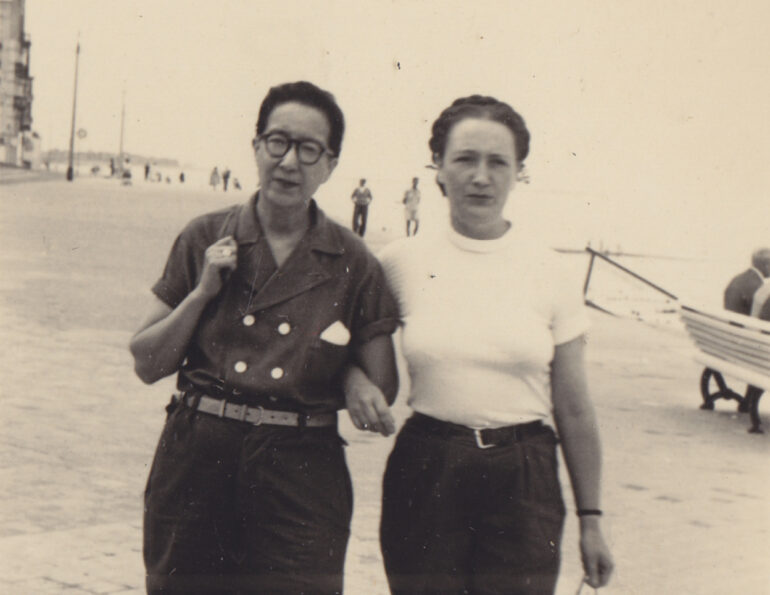Love conquers all (omnia vincit amor, Virgil, Eclogue X) is a romantic concept, inspiring art, literature, and even rock songs (Deep Purple) through the ages, but rarely do we see it happen in life. Yet in Nelly & Nadine, a documentary film by Magnus Gertten, the story of these two courageous women and their love reveals the truth inherent in these words. Moving and fascinating, Nelly & Nadine tells an intimate story of love that also provides a brief, yet vibrant look at queer history.

The film opens with striking black and white footage from April 1945, as concentration camp survivors arrive in Malmö, Sweden. Gertten, who first came across the footage in 2007, was compelled to find out more about the women he saw on the reel, learning their names and life stories. The results of his research led to the making of the documentaries Harbor of Hope in 2011 and Every Face Has a Name in 2015. Here, amid a sea of smiling faces, the film lingers on the serious visage of Nadine Hwang. Like the others, she has survived the concentration camps, yet it seems as though she looks to the future with more questions than expectations. Gertten learned more about Nadine from Sylvie Bianchi, who knew her as a friend of her late grandmother Nelly. The film is framed through the memories and experiences of Sylvie, who has a box full of Nelly’s belongings in the attic, a box Sylvie has never opened.
Sylvie remembers a grandmother who “always sang,” loved Christmas, and never talked about the war. As becomes apparent in the film, Christmas had a very special meaning for Nelly. When Sylvie opens the box for the first time as the cameras roll, she discovers a treasure – an abundance of written material, including Nelly’s diary, photographs, and Super 8 films. All these tell a story of a love forged in the Ravensbrück concentration camp, a love that triumphed and endured throughout Nelly and Nadine’s lives. As Sylvie looks through the photographs, somewhat surprised to find so many photographs of Nadine, she begins to realize that Nelly and Nadine were actually a couple.
Seen from a contemporary perspective it is somewhat surprising that despite visiting Nelly and Nadine throughout her childhood, Sylvie never realized their connection or wondered about it, and it was never discussed. As Sylvie embarks on a journey of discovery that takes her far from her farm in Northern France – literally and figuratively, the viewer learns about these two heroic women. Nelly Mousset-Vos was an opera singer, and two of her surviving recordings are heard in the film. Early on in the war she became involved in the Resistance, and was arrested in Paris in April, 1943. Nelly kept a diary during her imprisonment, and the eloquence of her expression is deeply moving. Researching Nadine’s background, Sylvie consults with the late Joan Schenkar, biographer of Patricia Highsmith and Dorothy Wilde. Looking over Nadine’s many photographs of “so many lovely ladies” Schenkar recognizes the prominent figures of the time – Djuna Barnes (Nightwood) and Natalie Clifford Barney, who founded and hosted “the most important literary salon that ever existed” for over 60 years. Barney founded the salon as an alternative to the all-male Académie Française. Nadine, who led an adventurous and atypical life for a woman of those times, moved to Paris in the 1930s and was Barney’s occasional secretary, chauffer, and lover.
Nelly and Nadine lived openly as a couple in Caracas, Venezuela after the war, and their home movies depict a life full of love, friendship, and laughter. They organized their diaries of the war and wanted to publish their memoirs, yet apparently, at the time, no publisher was interested in a lesbian love story. The film reflects the social norms of those times, as Nelly and Nadine’s relationship was never acknowledged by Nelly’s family. Sylvie’s journey through Nelly’s photographs, diary and film reels, shows the middle-aged woman moving through the difference between a child’s perspective on her grandmother to that of an adult. Not all is revealed in the documentary. We neither learn about Nelly’s life before the war, or that of her two daughters, nor of Nadine’s pre-Paris years. One can only speculate about the impact the war had on Claude, Sylvie’s mother, who was only 15 when Nelly was arrested by the Nazis. Separated in different camps during the final months of the war, Nadine, when filmed landing at Malmö with the other survivors, did not know whether Nelly was alive. We do not learn how Nelly and Nadine found one another, yet we know they did, and that they built a new, joyful life together. Nelly and Nadine’s story is a magnificent romance, as thrilling as any fiction, and all the more compelling in its truth. Omnia vincit amor.
TLVFest will be screening Nelly & Nadine at the Tel Aviv Cinematheque from Friday, April 7 – Tuesday, April 18, 2023. Tickets may be ordered on the TLVFest website.
Nelly & Nadine
Sweden/Belgium/Norway/2022/92 min/French, English, Swedish, Spanish with English and Hebrew subtitles.
Written and directed by Magnus Gertten
Berlin International Film Festival 2022 – Winner Teddy Jury Award
Thessaloniki Documentary Festival 2022
CPH:DOX Copenhagen International Documentary Film Festival 2022
Movies That Matter Festival, Netherlands 2022
Docs Against Gravity Film Festival, Poland 2022
TLVfest 2022 – Best Documentary Award





